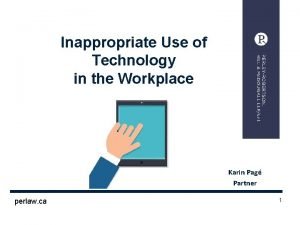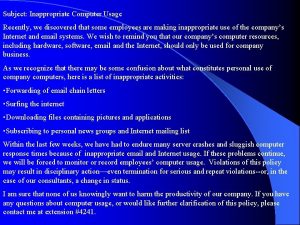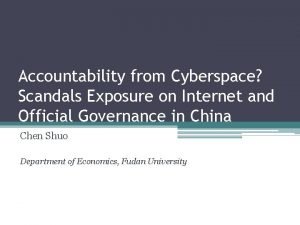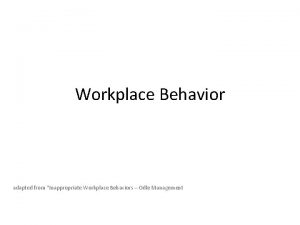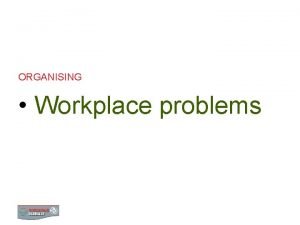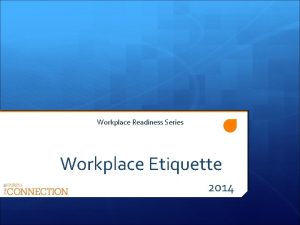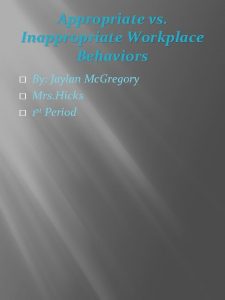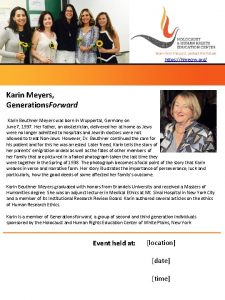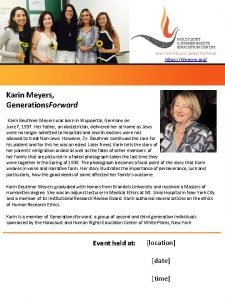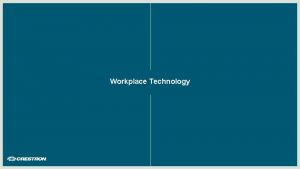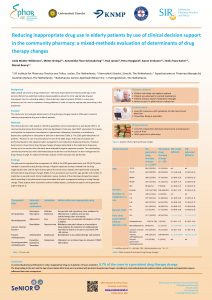Inappropriate Use of Technology in the Workplace Karin


















![Re Millhaven Fibres Ltd v Atomic Workers Int’l Union, Local 9 -670, [1967] O. Re Millhaven Fibres Ltd v Atomic Workers Int’l Union, Local 9 -670, [1967] O.](https://slidetodoc.com/presentation_image_h/2c773d29d8015b15ba008aeaa79eb68b/image-19.jpg)


















- Slides: 37

Inappropriate Use of Technology in the Workplace Karin Pagé Partner perlaw. ca 1

Inappropriate Use of Technology in the Workplace • Illegal activity • Accessing or distributing child pornography • Poisoning work environment through harassing or discriminatory messages • Circulating hateful or inappropriate emails, jokes, photos, etc. • Reputational harm • Emails sent to business contacts or using employer email address perlaw. ca 2

Inappropriate Use of Technology in the Workplace (con’t) • Theft of time • Personal email, social media activity • Streaming videos, browsing internet, dating websites • Shopping • Outside business interests • Harm to Systems • Network overload / speed • Exposure to viruses perlaw. ca 3

Employee Obligations • Serve employer honestly and faithfully • Act in best interests of employer and not conduct him/herself in a way that harms or places employer’s interests at risk • Does behaviour give rise to a breakdown in the employment relationship? • Balance between severity of misconduct and the sanction imposed • Number of incidents • Duration of conduct • Role and seniority of employee • Extent of employee’s involvement • Employer’s reasonable expectations • Previous misconduct / warnings perlaw. ca 4

Reasonable Search by Employer R v. Cole, 2012 SCC 53 • During regular IT system maintenance, found sexually explicit nude images of a student on teacher’s laptop in hidden file on hard drive; handed over to police • Diminished expectation of privacy vs home computer • But – reasonable expectation of privacy where incidental personal use is permitted or may reasonably be expected • Who owns computer/systems is only part of it • Workplace polices and practices can diminish individual’s expectation of privacy but does not absolve it • Closer the subject is to biographical core of personal information (e. g. financial / medical information), more likely there will be a reasonable expectation of privacy perlaw. ca 5

R. v. Cole (con’t) • Inquire whether individual has subjective expectation of privacy in the subject matter of the search • Assess whether this subjective expectation of privacy was objectively reasonable, having regard to the totality of the circumstances • In this case, the employee had a reasonable expectation of privacy in the information stored on the laptop, which was subject to the limited right of access by his employer’s IT technicians performing work-related functions. • Mr. Cole had no expectation of privacy in respect of that type of access perlaw. ca 6

Backman v. Maritime Paper Products Ltd. , 2008 NBQB 219 • Prior warning not to surf inappropriate web sites at work • Audit showed spent 1 -2 hours per day surfing explicit pornographic web sites on at least 10 days over one month • Undermined employer confidence in him as supervisor • Sexual harassment of IT employee who was required to view images • Just cause for dismissal • Take away: team leader or supervisor, having responsibility for ensuring a safe, productive workplace will be held to a higher standard perlaw. ca 7

Wong v. Lantic Inc. , 2012 Carswell. Alta 2249 (Q. B. ) • Supervisor • Employer policies - System Usage Agreement, Code of Business Conduct & Discrimination and Harassment Policy • Previously told to ensure employees not looking at anything other than work items on internet • Safety training session – inappropriate video shown – resulted in resignation & search of 3 computers • 25 emails – sexual, involve nudity, or racist • Some sent to external business contacts • Set inappropriate standard for subordinates perlaw. ca 8

York Region DSB v. Elementary Teachers’ Fed. of Ont, 2018 Can. LII 73669 (ON LA) • • Whether reasonable to engage in search and whether search conducted in reasonable manner Complaints re “log” being kept about a fellow teacher Employer had reasonable cause for concern Search was limited and targeted Log set up in private Google docs account which was password protected At end of day, document left open on classroom computer which was not for her exclusive use diminished expectation of privacy Information was not close to grievor’s “biographical core” – pertained to workplace issues Balancing of personal privacy interests of employee with employer’s right to manage its enterprise perlaw. ca 9

Outside Business / Charity Work Gravelle v. Dept of Justice, 2014 PSLRB 61 • Attendance, productivity and performance concerns • Suspicion that grievor spending work time / resources for car business • IT search revealed internet use abnormally high and related to car business; used DOJ email for Kijiji sales • Emails of personal nature about candidates in staffing process and documents re another competition in which he was a candidate were sent to his personal email • Time spent on “car sales” may have been hobby; but important issues re security breach, causing embarrassment to employer perlaw. ca 10

Outside Business / Charity Work (con’t) IBEW, Local 353 v. Ainsworth Inc. , 2015 Can. LII 45146 (ON LRB) • Document left open on computer, co-worker observed quotation for electrical work • Subsequent monitoring of email revealed grievor sent quotes during work hours for outside employment • Any expectation of privacy with respect to his personal email account, which he accessed on his employer’s computer at the workplace, was lost when he left his computer screen open upon leaving the workplace • Reasonable cause to continue monitoring based on apparent policy breach perlaw. ca 11

Outside Business / Charity Work (con’t) • City of Toronto v. CUPE Local 79 (re Sebrina Wright), 2016 Can. LII 80010 (ON LA) • 7 emails to her personal email account with work relating to: • “The Wright Place” a charity founded by her and her husband; • Job search cover letters & resumes for her and her husband (*biographical core) • Family picnic • Policies in place and was advised they were monitoring her computer usage and email; • Cleaned out her “H drive” so no alternative means perlaw. ca 12

City of Toronto v. CUPE Local 79 (re Sebrina Wright) (con’t) • Grievor’s work on personal matters was excessive and use of employer’s printers was unwarranted • Despite this, arbitrator felt those issues alone would not have been sufficient to warrant dismissal as they occurred over 6 week period only • But – grievor’s failure to be candid during investigation and in course of arbitration is important factor in deciding whether to reinstate the person to employment perlaw. ca 13

Emails with spouse inadmissible Saskatchewan Government & General Employees Union v. UNIFOR Local 481, 2015 Can. LII 28482 (SK LA) • Policies and practices may diminish an individual’s reasonable expectation of privacy but an employee does not check his/her dignity, integrity, and autonomy at the workplace door • Allowance for incidental personal use, albeit with reduced privacy • Search must be: • reasonable in circumstances; • carried out in a reasonable manner; and • only if less intrusive reasonable alternative does not exist • Spousal communications intimate & personal; in “deleted” items – suggests were not intended to be viewed by others perlaw. ca 14

Managing Privacy Expectations • Must have workplace policies addressing appropriate use of company resources including email and internet • Policies must be brought to attention of employees, reinforced and consistently applied • Where incidental personal use is allowed, care must be taken to make search reasonable in circumstances, i. e. where reasonable grounds exist and search is limited and targeted, avoiding information at the “biographical core” • Any disciplinary action must be proportionate to the misconduct perlaw. ca 15

Social Media and the Workplace perlaw. ca Joël M. Dubois Partner 16

Social Media in Canada According to the Canadian Internet Registration Authority (CIRA), • 77% of Canadians spend at least 3 to 4 hours online per day; • 60% of Canadians engage in social media; • Facebook continues to dominate as Canada’s favourite and most-used social media site • 1/3 of Canadians use Linked. In, Instagram and Whats. App https: //cira. ca/resources/corporate/factbook/canadas-internet-factbook-2019 perlaw. ca 17 1

Social Media and the Risk for Employers While social media can be a powerful communication tool, improper use can lead to: • Damaged corporate reputations; • Fractured workplaces; and • Upset coworkers perlaw. ca 18
![Re Millhaven Fibres Ltd v Atomic Workers Intl Union Local 9 670 1967 O Re Millhaven Fibres Ltd v Atomic Workers Int’l Union, Local 9 -670, [1967] O.](https://slidetodoc.com/presentation_image_h/2c773d29d8015b15ba008aeaa79eb68b/image-19.jpg)
Re Millhaven Fibres Ltd v Atomic Workers Int’l Union, Local 9 -670, [1967] O. L. A. A. No. 4 • Seminal decision on off-duty conduct. • For a discharge due to off-duty conduct, employer must show: • Conduct harms the employer’s reputation or product; • Employee unable to perform her/his duties satisfactorily; • Other employees refusal, reluctance or inability to work with her/him; • Conduct makes it difficult for the employer to efficiently manage its workers; • Others … • No need to satisfy all of these factors; a single factor may warrant discipline or termination. perlaw. ca 19

Groves v Cargojet Holdings Ltd. , 2011 Carswell. Nat 3422 • The Employee, an air cargo services provider, was terminated after she posted comments on her Facebook page concerning the lead hand to whom she reported. • Use of homophobic term; • References to kicking lead hand in the “twig and berries” and spitting in his face; • “My work is already enough like a high school. All people do is talk and everyone is so shady. I wish I could do that! Haha but then there would be a lot more people missing work from black eyes and broken bones lol” • Employee signed the Employer’s Workplace Violence Prevention Policy and Code of Ethics however neither contemplated off-duty conduct. • Facebook posts were only viewable by her “friends”. perlaw. ca 20

Toronto (City) v Toronto Professional Fire Fighters’ Association, Local 3888 • In 2013, two Toronto fire fighters, Mr. Bowman and Mr. Edwards, were dismissed for off-duty conduct. Specifically, they were fired for their inappropriate use of Twitter. • The fate of those individuals was decided in two arbitration decisions, providing guidance for employers seeking to discipline employees over social media use. • Standard Operating Policy: Conduct and Discrimination • Human Rights and Anti-Harassment/Discrimination Policy perlaw. ca 21

Toronto (City) v Toronto Professional Fire Fighters’ Association, Local 3888 The Toronto Fire Services also had a Standard Operating Guideline on Personal Use of Social Media, which stated: Employees are reminded that even though they are using social media for personal purposes, some City policies apply to off-duty conduct. perlaw. ca 22

“Where the internet is used to display commentary or opinion, the individual doing so must be assumed to have known that there is potential for virtually world-wide access to those statements. ” - Wasaya Airlines LP v ALPA, (2010) 195 LAC (4 th) 1 perlaw. ca 23

Mr. Bowman (2014 Can. LII 76886) • Mr. Bowman made numerous tweets that were sexist, racist and offensive to specific groups; including explicit references to violence and sexual violence. • The arbitrator noted that there were multiple tweets made by Mr. Bowman on different occasions. • The arbitrator found Mr. Bowman’s tweets to be offensive and agreed with the employer that it was damaging to its reputation and a serious violation of various policies. perlaw. ca 24

Mr. Bowman (cont’d) “The conduct was not an isolated incident. This was a course of conduct that took place over a period of about two years – slightly less than the duration of the grievor’s employment with the Toronto Fire Service. It was aggravated by the fact that the content, at its worst, tended toward the violent. (…) I consider this to have been very serious misconduct” perlaw. ca 25

Mr. Edwards (2014 Can. LII 62879) Dean Somerset @deansomerset Just stood behind a girl who used the word “like” roughly 300 times to order her coffee. Stay in skool, kidz. Lawaun Edwards @Bassfire 3680 @deansomerset would swat her in the back of the head been considered abuse or a way to reset the brain? Dean Somerset @deansomerset @Bassfire 3680 Maybe foreplay? Lawaun Edwards @Bassfire 3680 @deansomerset unlikely, intelligence and a vocabulary is sexy. Saying “like” that amount of times means you have none. perlaw. ca 26

Mr. Edwards (cont’d) • Unlike the previous decision, the grievor in this case was reinstated and a three-day suspension was substituted for his termination. • The arbitrator concluded that in this case, the tweets appeared to be an isolated incident and that the circumstances were at the low end of the spectrum of unacceptable behaviour. • Employer had policies regarding the use of social media however it had not publicized those policies as well as it might have done given the wide-spread use of social media. perlaw. ca 27

York University Staff Association v York University, 2018 Can. LII 41354 • Repeatedly associated his Facebook account with his employment at York University, both in his profile and in individual posts • Made frequent anti-Semitic posts • The University had Hate Propaganda and Racism policies; perlaw. ca 28

Tips for Employers Create an efficient and effective social media policy • You should involve all departments when drafting a social media policy (i. e. information technology, human resources, public relations, marketing, and corporate managers). • The policy should be broad enough to cover social media technology that will be introduced in the future. • The policy should not cover solely “company material”, such as the company blog, or the company’s social media accounts, but it should also cover the appropriate use of employees’ personal blogs, and social media profiles. • It should be clear that the policy is not restricted to work computer use, but that is also applies to off-duty social media use. perlaw. ca 29

Tips for Employers (cont’d) • It should be emphasized that employees must use caution and good judgment when posting on social media. • The policy and its enforcement should be clear to all employees (i. e. specify what disciplinary actions will be taken if policies are not followed). • The policy should be written and acknowledged in writing. • The policy should be simple and accessible. • The policy should be reviewed and updated on a regular basis. perlaw. ca 30

“Telecommuting” R. Aaron Rubinoff Partner perlaw. ca

“Telecommuting” • Flexibility • Bottom Line • Productivity perlaw. ca 32 1

Legal Logistics • Voluntary? • Mandatory? perlaw. ca 33 1

The Policy • Eligibility Criteria? • Work performance expectations? • Home office? • Insurance? perlaw. ca 34

Legislation Ontario Human Rights Code, RSO 1990, c H 19 • Example: refusal to accommodate for ailing mother Occupational Health and Safety Act, RSO 1990, c O 1 • Evolving Employment Standards Act, 2000, SO 2000, c 41 • Example: over time hours perlaw. ca 35

Common Employer Concerns 1. 2. 3. 4. 5. 6. 7. Time Theft Not conducive Supervision Other employees’ reservations Communication breakdown Distractions Isolation perlaw. ca 36

Concerns becoming a reality? Solutions • Flexible schedule • Revocable policy perlaw. ca 37
 Inappropriate use of technology in the workplace
Inappropriate use of technology in the workplace Inappropriate computer use
Inappropriate computer use Inappropriate evidence example
Inappropriate evidence example Narrow qrs complex
Narrow qrs complex 5 moods of verbs
5 moods of verbs Fbla dress code for females
Fbla dress code for females Define developmentally appropriate
Define developmentally appropriate Inappropriate behavior
Inappropriate behavior Midriff
Midriff Workplace technology vocabulary
Workplace technology vocabulary Hình ảnh bộ gõ cơ thể búng tay
Hình ảnh bộ gõ cơ thể búng tay Slidetodoc
Slidetodoc Bổ thể
Bổ thể Tỉ lệ cơ thể trẻ em
Tỉ lệ cơ thể trẻ em Chó sói
Chó sói Thang điểm glasgow
Thang điểm glasgow Hát lên người ơi
Hát lên người ơi Các môn thể thao bắt đầu bằng tiếng bóng
Các môn thể thao bắt đầu bằng tiếng bóng Thế nào là hệ số cao nhất
Thế nào là hệ số cao nhất Các châu lục và đại dương trên thế giới
Các châu lục và đại dương trên thế giới Công thức tính độ biến thiên đông lượng
Công thức tính độ biến thiên đông lượng Trời xanh đây là của chúng ta thể thơ
Trời xanh đây là của chúng ta thể thơ Mật thư anh em như thể tay chân
Mật thư anh em như thể tay chân 101012 bằng
101012 bằng độ dài liên kết
độ dài liên kết Các châu lục và đại dương trên thế giới
Các châu lục và đại dương trên thế giới Thể thơ truyền thống
Thể thơ truyền thống Quá trình desamine hóa có thể tạo ra
Quá trình desamine hóa có thể tạo ra Một số thể thơ truyền thống
Một số thể thơ truyền thống Cái miệng bé xinh thế chỉ nói điều hay thôi
Cái miệng bé xinh thế chỉ nói điều hay thôi Vẽ hình chiếu vuông góc của vật thể sau
Vẽ hình chiếu vuông góc của vật thể sau Nguyên nhân của sự mỏi cơ sinh 8
Nguyên nhân của sự mỏi cơ sinh 8 đặc điểm cơ thể của người tối cổ
đặc điểm cơ thể của người tối cổ Thế nào là giọng cùng tên?
Thế nào là giọng cùng tên? Vẽ hình chiếu đứng bằng cạnh của vật thể
Vẽ hình chiếu đứng bằng cạnh của vật thể Phối cảnh
Phối cảnh Thẻ vin
Thẻ vin đại từ thay thế
đại từ thay thế
